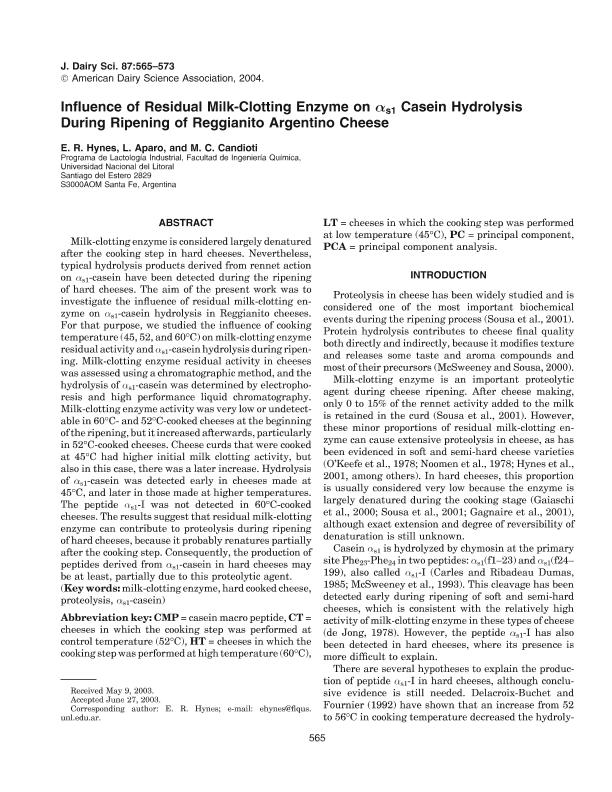Mostrar el registro sencillo del ítem
dc.contributor.author
Hynes, Erica Rut

dc.contributor.author
Aparo, Luciana
dc.contributor.author
Candioti, Mario César

dc.date.available
2020-11-05T18:56:17Z
dc.date.issued
2004-04
dc.identifier.citation
Hynes, Erica Rut; Aparo, Luciana; Candioti, Mario César; Influence of residual milk-clotting enzyme on αs1 casein hydrolysis during ripening of Reggianito Argentino cheese; American Dairy Science Association; Journal of Dairy Science; 87; 3; 4-2004; 565-573
dc.identifier.issn
0022-0302
dc.identifier.uri
http://hdl.handle.net/11336/117718
dc.description.abstract
Milk-clotting enzyme is considered largely denatured after the cooking step in hard cheeses. Nevertheless, typical hydrolysis products derived from rennet action on αs1-casein have been detected during the ripening of hard cheeses. The aim of the present work was to investigate the influence of residual milk-clotting enzyme on αs1-casein hydrolysis in Reggianito cheeses. For that purpose, we studied the influence of cooking temperature (45, 52, and 60°C) on milk-clotting enzyme residual activity and αs1-casein hydrolysis during ripening. Milk-clotting enzyme residual activity in cheeses was assessed using a chromatographic method, and the hydrolysis of αs1-casein was determined by electrophoresis and high performance liquid chromatography. Milk-clotting enzyme activity was very low or undetectable in 60°C- and 52°C-cooked cheeses at the beginning of the ripening, but it increased afterwards, particularly in 52°C-cooked cheeses. Cheese curds that were cooked at 45°C had higher initial milk clotting activity, but also in this case, there was a later increase. Hydrolysis of αs1-casein was detected early in cheeses made at 45°C, and later in those made at higher temperatures. The peptide αs1-I was not detected in 60°C-cooked cheeses. The results suggest that residual milk-clotting enzyme can contribute to proteolysis during ripening of hard cheeses, because it probably renatures partially after the cooking step. Consequently, the production of peptides derived from αs1-casein in hard cheeses may be at least, partially due to this proteolytic agent.
dc.format
application/pdf
dc.language.iso
eng
dc.publisher
American Dairy Science Association

dc.rights
info:eu-repo/semantics/openAccess
dc.rights.uri
https://creativecommons.org/licenses/by-nc-sa/2.5/ar/
dc.subject
HARD COOKED CHEESE
dc.subject
MILK-CLOTTING ENZYME
dc.subject
PROTEOLYSIS
dc.subject
ΑS1- CASEIN
dc.subject.classification
Otras Ciencias Biológicas

dc.subject.classification
Ciencias Biológicas

dc.subject.classification
CIENCIAS NATURALES Y EXACTAS

dc.title
Influence of residual milk-clotting enzyme on αs1 casein hydrolysis during ripening of Reggianito Argentino cheese
dc.type
info:eu-repo/semantics/article
dc.type
info:ar-repo/semantics/artículo
dc.type
info:eu-repo/semantics/publishedVersion
dc.date.updated
2020-10-22T18:25:11Z
dc.journal.volume
87
dc.journal.number
3
dc.journal.pagination
565-573
dc.journal.pais
Estados Unidos

dc.journal.ciudad
Champaign
dc.description.fil
Fil: Hynes, Erica Rut. Consejo Nacional de Investigaciones Científicas y Técnicas. Centro Científico Tecnológico Conicet - Santa Fe. Instituto de Lactología Industrial. Universidad Nacional del Litoral. Facultad de Ingeniería Química. Instituto de Lactología Industrial; Argentina
dc.description.fil
Fil: Aparo, Luciana. Universidad Nacional del Litoral. Facultad de Ingeniería Química. Programa de Lactología Industrial; Argentina
dc.description.fil
Fil: Candioti, Mario César. Consejo Nacional de Investigaciones Científicas y Técnicas. Centro Científico Tecnológico Conicet - Santa Fe. Instituto de Lactología Industrial. Universidad Nacional del Litoral. Facultad de Ingeniería Química. Instituto de Lactología Industrial; Argentina
dc.journal.title
Journal of Dairy Science

dc.relation.alternativeid
info:eu-repo/semantics/altIdentifier/doi/http://dx.doi.org/10.3168/jds.S0022-0302(04)73198-7
dc.relation.alternativeid
info:eu-repo/semantics/altIdentifier/url/https://www.journalofdairyscience.org/article/S0022-0302(04)73198-7/fulltext
Archivos asociados
